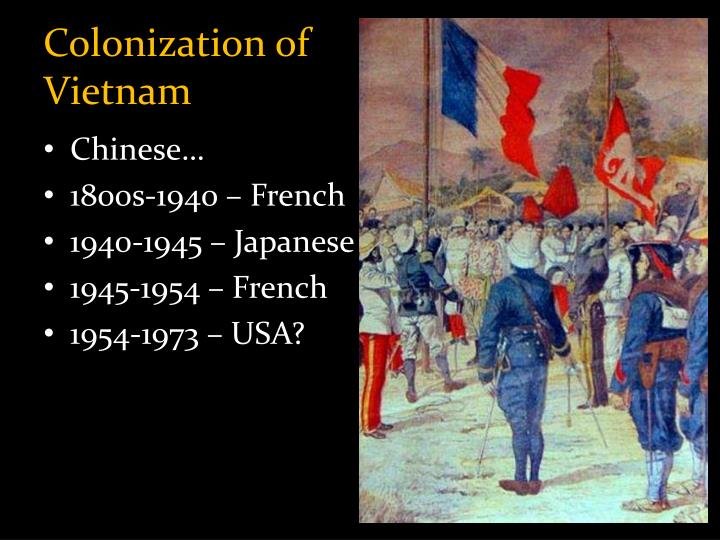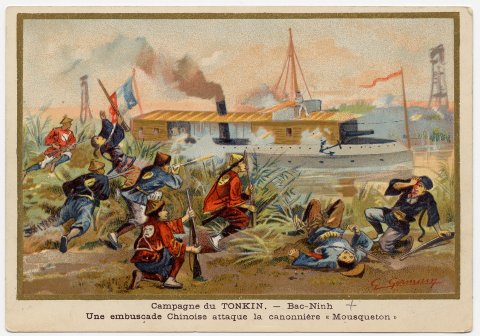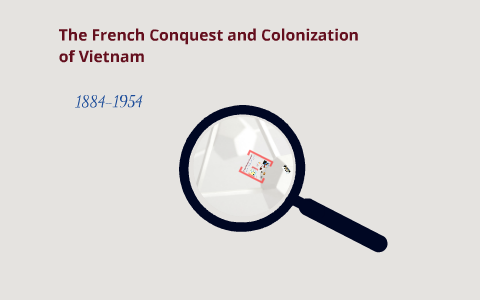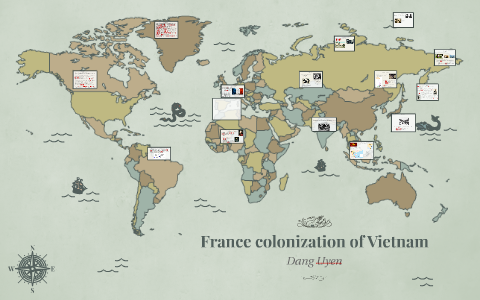The French Conquest Of Vietnam: A Historical Examination
The French Conquest of Vietnam: A Historical Examination
Related Articles: The French Conquest of Vietnam: A Historical Examination
Introduction
With enthusiasm, let’s navigate through the intriguing topic related to The French Conquest of Vietnam: A Historical Examination. Let’s weave interesting information and offer fresh perspectives to the readers.
Table of Content
The French Conquest of Vietnam: A Historical Examination

The French colonization of Vietnam, spanning from the 19th century to the mid-20th century, was a complex and multifaceted process, marked by both economic and political motivations. Understanding the French conquest requires examining its historical context, the key events, and the lasting impact on both Vietnam and France. This analysis will delve into the key elements of the French conquest, highlighting the motivations, strategies, and consequences of this historical period.
Early Encounters and the Seeds of Colonization:
Prior to the 19th century, European interactions with Vietnam were primarily through trade. The Portuguese were the first Europeans to reach Vietnam in the 16th century, followed by the Dutch and the French. However, it was the French who would eventually establish a dominant presence.
- Missionary Influence: French Catholic missionaries played a significant role in shaping early French involvement in Vietnam. They arrived in the 17th century, establishing missions and converting local populations. This missionary activity provided the French with a foothold in Vietnamese society and facilitated cultural exchange.
- Economic Interests: As European powers sought new markets and resources, Vietnam became increasingly attractive. The French, particularly after the Industrial Revolution, were keen on accessing Vietnam’s natural resources, such as rice, timber, and minerals.
- Strategic Considerations: The French saw Vietnam as strategically important in the context of their colonial ambitions in Southeast Asia. Vietnam’s location along the Mekong River and its proximity to China made it a valuable asset for trade and military control.
The French Conquest and the Establishment of a Colonial Regime:
The French conquest of Vietnam can be divided into three distinct phases:
- The First Indochina War (1858-1862): This conflict began with the French seizure of the port of Đà Nẵng, followed by the capture of Saigon. The Vietnamese government, weakened by internal conflicts, was unable to effectively resist the French military superiority. This war resulted in the French annexation of Southern Vietnam, known as Cochinchina.
- The Second Indochina War (1883-1884): The French, seeking to expand their control, launched a campaign against the Vietnamese court in Huế. After a series of battles and negotiations, the French established a protectorate over the northern and central parts of Vietnam, known as Annam and Tonkin. This effectively brought the entire country under French control.
- The Consolidation of French Rule: Following the establishment of the protectorates, the French consolidated their power by imposing their political, economic, and social systems on Vietnam. They established a colonial administration, controlled key sectors of the economy, and implemented policies aimed at assimilating Vietnamese society into French culture.
The Impact of French Colonization:
The French conquest of Vietnam had a profound and lasting impact on both Vietnam and France.
- Economic Exploitation: The French colonial regime exploited Vietnam’s natural resources for its own economic benefit. They imposed high taxes, controlled trade, and established plantations for cash crops like rubber and coffee, which enriched France at the expense of the Vietnamese people.
- Social and Cultural Transformation: The French introduced their own language, education system, and legal framework, which had a significant impact on Vietnamese society. While some Vietnamese intellectuals embraced French culture, others resisted these changes, leading to cultural and social tensions.
- Nationalism and Resistance: French colonial rule, with its inherent inequality and exploitation, sparked Vietnamese nationalism. Resistance movements emerged, culminating in the Indochina War (1946-1954), which ultimately led to Vietnam’s independence.
The Legacy of the French Conquest:
The French conquest of Vietnam left a complex and enduring legacy.
- Economic Development: While the French exploited Vietnamese resources, they also introduced some infrastructure, including roads, railways, and ports, which contributed to economic development in the long run.
- Education and Modernization: The French introduced Western education to Vietnam, which contributed to the emergence of a Vietnamese intellectual class and the spread of modern ideas.
- Political Instability: The French conquest sowed the seeds of political instability in Vietnam, leading to decades of conflict and division.
FAQs:
Q: What were the key motivations behind the French conquest of Vietnam?
A: The French conquest was driven by a combination of economic, political, and strategic motivations. They sought access to Vietnam’s natural resources, desired to expand their colonial empire, and saw Vietnam as a strategic location in Southeast Asia.
Q: How did the French establish and maintain control over Vietnam?
A: The French used a combination of military force, diplomatic maneuvers, and administrative control to establish and maintain their dominance in Vietnam. They employed superior military technology, exploited Vietnamese internal conflicts, and established a colonial administration to enforce their policies.
Q: What were the long-term consequences of the French conquest of Vietnam?
A: The French conquest had a profound and lasting impact on Vietnam, leading to economic exploitation, social and cultural transformation, the rise of nationalism, and decades of conflict. While the French introduced some aspects of modernization, their colonial rule ultimately left Vietnam with a legacy of political instability and social inequalities.
Tips:
- Utilize Primary Sources: Consult historical documents, memoirs, and journals from the period to gain deeper insights into the French conquest.
- Analyze French Colonial Policy: Examine the policies and practices implemented by the French colonial regime to understand how they shaped Vietnamese society.
- Compare and Contrast with Other Colonization Experiences: Compare the French conquest of Vietnam with other colonial experiences in Southeast Asia and around the world to identify commonalities and differences.
Conclusion:
The French conquest of Vietnam was a pivotal moment in Vietnamese history, shaping the country’s social, political, and economic landscape. While the French introduced some aspects of modernization, their colonial rule was characterized by exploitation, suppression, and the imposition of their own cultural values. The legacy of the French conquest continues to resonate in Vietnam today, influencing its national identity, political systems, and economic development. Studying this historical period provides valuable insights into the complexities of colonialism and its enduring impact on the world.








Closure
Thus, we hope this article has provided valuable insights into The French Conquest of Vietnam: A Historical Examination. We hope you find this article informative and beneficial. See you in our next article!